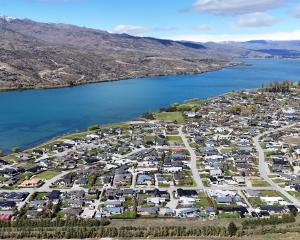
Now in 202 and living in Lauder, his year 11 daughters, Katie and Emily were also staying at the hostel.
Growing up in the Teviot Valley, Mr Lunn attended the hostel because of the lack of a bus route into Alexandra, he would board five days a week.
An average day at the hostel started at 7am, when students were woken by the hostel manager or matron.
At 7.30am students rooms were checked to ensure their beds were made and everything was tidy.
Three to four students would be together in a room, each room had their own toilets and shower.
The students then attended breakfast where they would sit in their assigned seats.
Seats at in the dining room tables were arraigned in a way so there was a mix of ages and gender during each term, he said.
"Because it was consistent, for a term at least, you'd get to know people and have a bit of a talk over dinner or whatever."
It was also to ensure that every student was present.
After breakfast the students attended class until lunchtime, which was the main meal of the day, he said.
After lunch students would attend class until 3.
As a lot of students had sport practice after class one of the benefits of the hostel was that parents would not need to constantly drive back and forwards for practices or games.
If students did not play sports they had two hours to fill in either on the hostel grounds or if they wanted to go into town they would need permission or to sign out if they were seniors.
Dinner was served at 5.30pm and Mr Lunn said the dinners were not as big as lunch, but the food was quite good.
After dinner students helped clean and did their homework, at 8.30pm they would then prepare for bed, with lights out for juniors at 9.30pm and seniors at 10.30pm.
"Life was really good ... it was like a joint family."
Looking back Mr Lunn found living in the hostel helped him learn resilience and self-belief.
When the family had recently returned to Central Otago after living in Canterbury, Mr Lunn and his wife Alison felt sending the sisters to the hostels would help them to create a new group of friends and ease them into life there, he said.
Mr Lunn said he noticed the same increase in self-belief and resilience in his daughter he experienced himself.
Another benefit of the hostels was the convenience, Mr and Mrs Lunn both worked full time and both sisters played sport.
Staying at the hostels meant there was no need to spend hours in a car going to and from practice which costed time and fuel, he said.
Despite the ups and downs of hostel life, Mr Lunn believed it was the right decision to send his daughters to the hostel.
"Yes, it is slightly more [expensive] to come to the hostel, but I think the benefits probably outweigh the cost."
Mr Lunn said moving was a big thing for his daughters and he thought they had done well.












